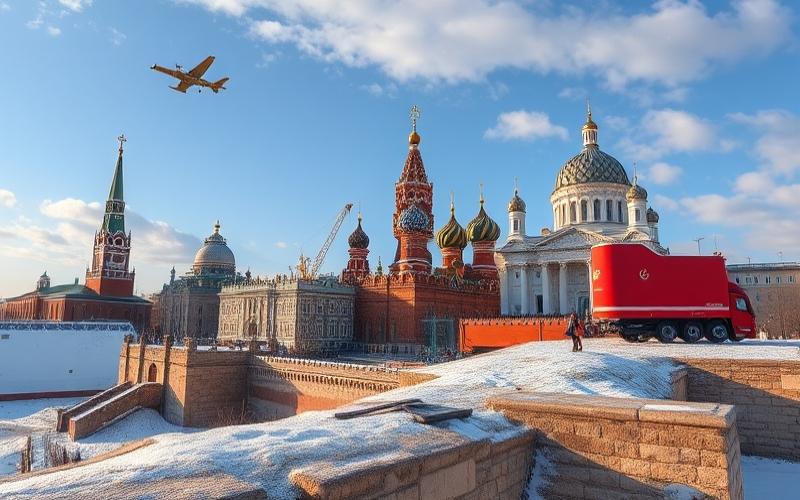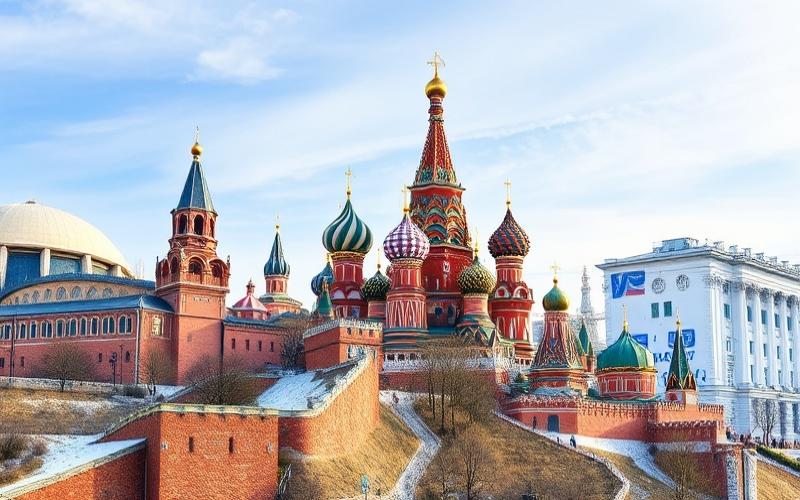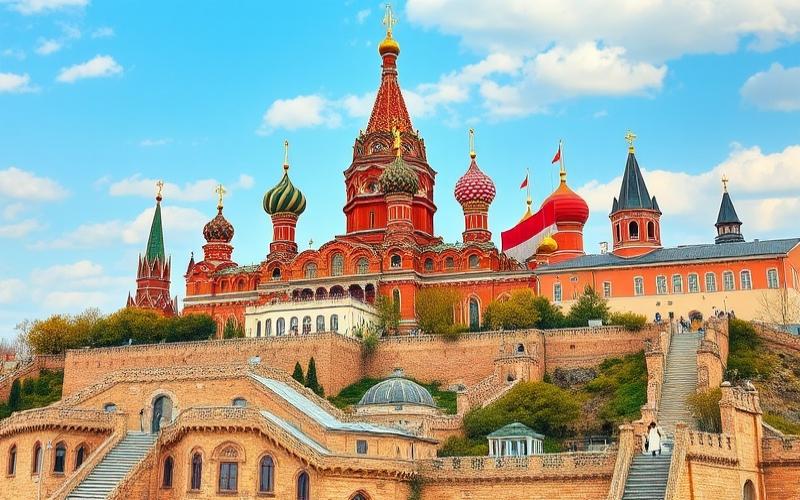
 Published on and written by Cyril Jarnias
Published on and written by Cyril Jarnias
Self-employment in Russia is undergoing dynamic evolution within an ever-changing economic landscape. New legislative measures aim to streamline administrative procedures for these workers while strengthening their integration into the national tax system.
Amid economic challenges and growing opportunities, self-employed workers play a crucial role in diversifying the Russian labor market. Through a detailed analysis of their status and reporting obligations, this article aims to illuminate the major issues affecting these essential actors in Russia’s modern economy.
Understanding the Self-Employed Status in Russia
The self-employed status in Russia, called IP (Individualny Predprinimatel), is primarily governed by the Russian Civil Code and specific laws on individual entrepreneurial activity. This status aims to facilitate the management of small businesses or independent activities without requiring the creation of a commercial company.
Eligibility Criteria:
- Be of legal age (minimum 18 years).
- Legally reside in Russia: Russian citizens or foreigners holding temporary or permanent residence permits.
- Have no criminal convictions for certain regulated activities.
Administrative Procedures for Registration:
- Complete an official application form (P21001).
- Submit a copy of passport and, for foreigners, a notarized translation along with proof of right of residence.
- File the application with the local federal tax service.
- No share capital required nor board of directors.
Simplified List of Administrative Steps:
- Completed official form
- Notarized passport copy and translation
- Proof of legal residence
- Submission to relevant tax office
Tax Obligations and Reporting:
| Tax Type | Applicable Rate | Reporting Frequency |
|---|---|---|
| Income Tax | 6% to 15% depending on chosen regime | Annual |
| Social Contributions | Fixed annual amount | Quarterly |
| VAT | Applicable only if revenue > legal threshold (20%) | Quarterly |
The self-employed individual can opt for a simplified regime (“patent” or “simplified system”) with reduced rates (6% on revenue or 15% on profit). Reporting is generally done annually but some contributions must be paid quarterly.
Typical Schedule:
- Annual declaration before end of March for previous year
- Social contribution payments each quarter
Main Advantages:
- Administrative simplicity: reduced formalities, easier management compared to traditional companies like OOO (limited liability company);
- Reduced taxation: choice between several tax regimes adapted to small incomes;
- No share capital required nor complex accounting obligations;
- Freedom in choosing activities according to OKVED classification;
Major Limitations:
- Maximum annual revenue cap imposed under certain simplified regimes;
- Unlimited liability on personal assets in case of business debts;
- Limited access to certain public markets or bank credits reserved for traditional companies;
IP vs OOO Comparison:
| Criterion | IP/Self-Employed | OOO/Traditional Company |
|---|---|---|
| Formalities | Very simple | Complex |
| Share Capital | None | Minimum required |
| Liability | Unlimited | Limited |
| Taxation | Simplified regime possible | Standard regime + VAT |
Practical Examples & Experience Feedback:
A self-employed retail merchant chose this status to avoid accounting constraints and benefit from the flat-rate system. According to their testimony, they appreciate the simplicity but sometimes regret the restricted access to bank credit. Another self-employed language service provider emphasizes that registration took less than a week thanks to the Russian digital single window; she mentions as the only drawback a fixed tax burden that can be heavy during slow periods.
“I was able to start my business with just my temporary residence permit and a few documents translated by a notary. It’s ideal when you’re starting out…”
This framework therefore offers administrative flexibility but is especially suitable for entrepreneurs whose ambitions remain limited in financial volume or number of employees.
Good to Know:
The self-employed status in Russia allows for simplified taxation with a flat tax rate of 6%, provided annual income does not exceed 2.4 million rubles, and requires prior registration with local tax authorities.
Tax Reporting for Self-Employed Individuals
Tax Obligations of Self-Employed Workers in Russia
Self-employed workers in Russia must register with tax authorities and are personally responsible for reporting and paying their taxes and social contributions. No withholding is made at source by their clients or employers.
Available Tax Regimes for Self-Employed Individuals
| Tax Regime | Main Conditions | Tax Rate | Main Advantages/Disadvantages |
|---|---|---|---|
| USN (simplified regime) | Revenue ≤ 150 million RUB/year. No prohibited activities. | 6% (income) or 15% (income – expenses) | Simplifies accounting. Revenue cap. |
| NPD (professional income tax) | Reserved for self-employed without employees and revenue ≤ 2.4 million RUB/year. | 4% (income from individuals), 6% (income from businesses) | No accounting or mandatory social contributions. |
| PSN (patent system) | For certain activities, revenue ≤ 60 million RUB/year, up to 15 employees. | Flat rate according to activity, generally around 6% | Simplicity, but limited activities. |
Selection Criteria Between Regimes:
- Annual revenue volume
- Presence or absence of employees
- Nature of activity performed
- Administrative simplicity sought
- Eligibility for regime (certain professions or regions)
Tax Reporting and Deadlines
- Annual income tax return: generally to be filed before April 30 of the following year.
- Tax payment: before July 15.
- Quarterly or monthly reporting: depending on chosen regime, particularly for USN.
- NPD: no annual return required, automatic payment via mobile app or tax platform.
Procedures for Calculating and Paying Taxes
- Calculate taxable income according to chosen regime.
- Complete tax return on official tax portal (nalog.ru) or via official mobile app for NPD.
- Pay amount due before deadline by bank transfer, card, or online payment platform.
Penalties for Non-Compliance
- Late filing: flat fine or percentage of tax due.
- Late payment: daily late fees calculated on unpaid amount.
- Omission or fraud: tax audits, heavier financial sanctions, even activity prohibition in case of repeat offenses.
Practical Tips for Tax Management
- Keep an up-to-date record of income and expenses, even under simplified regime.
- Automate reminders for tax deadlines.
- Use adapted accounting software or dedicated mobile applications.
- Consult an accountant specialized in Russian taxation, especially when choosing regime or in case of activity change.
Resources and Tools for Ensuring Compliance
- Online accounting services: Russian platforms specialized for self-employed (e.g., “Moi Delo”, “Kontur Elba”).
- Official mobile applications for tax reporting and payment under NPD regime.
- Official portal of Russian tax administration: information, forms, and online assistance.
- Professional forums and self-employed networks to exchange practical advice.
Complying with tax obligations is essential to avoid penalties and ensure the sustainability of your self-employed activity in Russia.
Good to Know:
Self-employed workers in Russia can opt for the simplified taxation regime (USN) if they meet certain income criteria, allowing them to benefit from reduced rates, but must submit their annual returns before April 30 and pay their quarterly taxes on time to avoid high penalties. To ensure tax compliance, they can use accounting services or digital tax assistance platforms that facilitate tax calculation and payment.
Administrative Guide for Expatriate Freelancers
Administrative Procedures for Expatriate Freelancers in Russia
- Obtain a work visa:
- Request an official invitation from a Russian employer or organization.
- Submit visa application at Russian consulate with required documents (invitation, passport, photos, various proofs).
- Undergo medical check in some cases and subscribe to local health insurance.
- Upon arrival: register with migration service within seven business days of entry into territory.
- Register as self-employed worker:
- Two main statuses possible for foreign freelancers:
- Individual Entrepreneur (IP): registration with Federal Tax Service, opening dedicated bank account. Allows working without particular limitations and authorizes invoicing Russian companies. Basic income tax from 6% depending on chosen regime and mandatory annual social contributions.
- Self-Employed NPD: simplified registration via mobile app or website. Income tax calculated automatically (4% if income from individuals, 6% if from businesses). No annual return required but caps on annual revenue and limited activities.
- Two main statuses possible for foreign freelancers:
Tax Obligations
| Status | Main Rate | Reporting | Social Contributions | Annual Cap |
|---|---|---|---|---|
| Self-Employed NPD | 4% or 6% | Automatic | Not mandatory | ≈2.4 million RUB |
| Entrepreneur IP | 6%/15% | Annual | ≈40,874 RUB/year | No fixed cap |
Freelancers must keep their accounting up to date and retain all supporting documents related to payments received and made.
Income must be reported according to their tax regime; for IPs, reporting is annual while the mobile app handles NPD reporting automatically.
Practical Tips
- Centralize all official documents related to stay (visa/work), client/supplier contract(s), invoices issued/received as well as bank proofs.
- Systematically digitize each important administrative document to quickly respond to requests from local authorities or in case of tax audit.
- Regularly consult official Russian websites regarding tax legislation to anticipate any regulatory changes affecting your freelance activity.
- Using a specialized provider like Employer of Record (EOR) can significantly simplify all these procedures: centralized administrative management, guaranteed compliance with local legislation, continuous assistance to avoid any errors that could lead to penalties or delays in your payments.
Useful Resources
- Official Russian mobile app dedicated to NPD self-employed
- Portal of Russian Federal Tax Service
- EOR providers specialized in assisting international self-employed workers
- French-speaking forums dedicated to expatriates in Russia to share practical experiences
Checklist of Essential Procedures:
- Prepare all necessary documents before departure (including potential client contracts)
- Complete legal registration upon arrival
- Choose appropriate status between IP/NPD
- Open professional bank account
- Regularly manage accounting and tax obligations
To guarantee your administrative compliance in Russia as an expatriate freelancer, it is recommended:
‣ To carefully select your legal status according to your professional needs,
‣ To be assisted by a local expert during initial procedures,
‣ To anticipate each tax deadline through rigorous document organization.
Good to Know:
To register as a self-employed worker in Russia, it is essential to obtain an adequate work visa and register with the Federal Tax Service; note that freelancers must report their income quarterly and pay income tax at a rate of 13%.
Disclaimer: The information provided on this website is for informational purposes only and does not constitute financial, legal, or professional advice. We encourage you to consult qualified experts before making any investment, real estate, or expatriation decisions. Although we strive to maintain up-to-date and accurate information, we do not guarantee the completeness, accuracy, or timeliness of the proposed content. As investment and expatriation involve risks, we disclaim any liability for potential losses or damages arising from the use of this site. Your use of this site confirms your acceptance of these terms and your understanding of the associated risks.























































